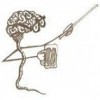Truth or just another Grammar Nazi whining as they age?
This link (below) is an amusing article about the decay of the English language. Some of the points are excellent, but then again, language is an evolving thing and always has been. So, what do you think, does this article represent the demise of the English language, some writer having a geek meltdown or some other thing entirely?
Washington Post: http://www.washingtonpost.com/wp-dyn/co … 04476.html
(I wonder what the writer would say about my use of "they" lol)I think it's "some other thing entirely." I agree with you that it's amusing - in fact, I thought it was hilarious.
To me the difference between grammar-policing, writer-geek-melting-down, aged-whining, and this article revolves around the focus of the attention. The writer is not carping about The Man in the Street's use of evolving language, but rather the proliferation of sloppy language use in newspapers - print media which in the past have helped to maintain standards of language use (even evolving standards).
All of the various types of change mentioned in the article can be elements in the development of language. But isn't there generally a point in that process when a certain construction, pronunciation, or spelling is considered "acceptable" (i.e., "acceptable in such-and-such a circumstance") or not? (Doesn't "dog-eat-dog world" communicate something specific and different from "doggy dog world" - something worth trying to preserve?)
So much of acceptability and appropriateness depends on the milieu and the audience where the language is used, and in my opinion that is what makes this article valid commentary expressed as hyperbole, as opposed to a meltdown.
[SB, where did you use "they"? Are you talking about using it elsewhere, or did you edit it out before posting?]I agree with you that context is important. And the point that newspapers are doing stuff like "alot" is bad. I think the "youngest" thing is a bit too anal-retentive though. I'm all for allowing language to change, but I think you and I agree is should not be in a fit of errors.
And I used "they" in the thread title. It's one of my personal pet peeves is the "he or she" thing. My understanding is that in Europe you can use they or their in a sentence like: Everyone needs to bring their books to class.
In the U.S. doing that makes you illiterate. At least by the standards of many. Personally, in a PC, hyper-sensitive world where this stuff becomes an issue, we should get to use "they" because, frankly, saying "everyone should bring his or her books to class" is lame. And it gets LAMER with each successive appearance over the course of a document. (See, you got me going lol).The use of the word "they" as a gender-indefinite singular pronoun in the English language dates back to the time of Chaucer. There, that should make you feel better.

"They" is particularly difficult, because while it's technically wrong, there isn't a convenient way to deal with the issue. "Everyone should bring one's jacket." Just sounds weird.
Languages should be allowed to evolve but if it devolves to the point of hampering communication, or makes it impossible to read books from a few hundred years ago, it's kind of a problem.
Though I get really annoyed at little grammar errors. It's kind of fun.Actually, when I was in elementary school many decades ago we learned that using "they" for non-specific gender was absolutely correct in everyday speech, whereas "one" would be considered more formal speech. In the period since then, its use has fallen into disfavor and I am delighted - even thrilled - that it is coming back to replace the ungraceful "him or her" and "he or she."
Periodically, some self-important guru comes out with pronouncements of their own preferences as absolutes (such as the asinine dogma that a sentence should never end with a preposition - totally ludicrous!), and a gullible public follows along like sheep. Or perhaps it's not a guru who makes the pronouncement, but rather public speakers (announcers in the media, e.g.) who may have to think quickly and can't come up with the best form of expression on the spur of the moment.
My current humongous peeve is the blurring of singular and plural verb forms in reference to the same (usually singular) item, such as this example, based on similar phrases I hear often on the radio: "The one thing we really hated the most were the grammatical errors of journalists who don't proofread their work." One thing were????
Aaarrrgggghhhhhhhhhhh!That's because grammar isn't taught like it used to be. Kids aren't diagramming sentences and learning how to break out nouns from their modifiers. That's not an evolving language thing; that's a failure to educate properly. Another casualty of our "everyone should feel good at all times" society that eschews discipline in favor of Utopian concepts of unearned self-respect.
Amen! (Ooops, am I allowed to use that term in this category? lol)
I can understand it and grudgingly tolerate it to an extent in the young (hoping they have time for education to kick in), although I realize that if they are not taught well today then their uncertainties and fuzziness will only increase tomorrow.
But since I hear this kind of problem from people my own age too, I believe that it's more than purely a failure to educate properly. I do agree though that that is the primary cause of many of the language problems that irritate me.
That makes me happy, because one doesn't like filling one's sentences with ones.
http://prowritingtips.com/2008/11/top-5-grammar-myths/
I've seen these myths listed with historical reason for how they developed, but I can't find it. It basically said English has Germanic roots, so it's ok to follow German rules, rather than obeying Latin grammar. So "to boldly go where no man has gone before" doesn't lose points for a split infinitive, and it sounds way cooler.That's a great link you've posted, eslevy17. Great advice, beautifully written.
My dear old Latin teacher once told us that the "no prepositions at the end of the sentence" "rule" was actually written by some sourpuss grammarian who had been kept up late one night with indigestion. Who knows? Maybe that's the source of a lot of life's misconceptions.The original article with the backstories said a few of the rules were popularized by particular people, which it named, in fairly recent history, even up until the 1800s, so your teacher was probably right.
(And by the way I didn't write that article, and I couldn't tell if the compliments were supposed to be for me)
Check this out, it's Mark Twain's recommendation for altering the English language to be phonetic. Hilarious.
http://design.caltech.edu/erik/Misc/Twain_english.html
All language evolves. Consider all the new terminology added in the 20th century, not even the 21st century.
Consider Elizabethan English to present day.
Hanging on to old rules may or may not be bad. Change can be, in many cases, improvement, not degradation of the language.'Doggy dog' world isn't an improvement IMHO, it is just nonsense. While not all chamge is bad, neither is it all good.
I rooly dunno wot all tha fus iz about on dis subjekt. If ya carnt make yor wordz prununcibil when yu typin dem Hubs. Why wuld peeps that carnt type n stuff be ere then?
Iz bess to gotoo oosin teknolgy to helpp then wif all taht ather garbo dem that be useless guf guv.
kewl?"doggy dog world" isn't the language changing. It's just some guy who can't be bothered to understand the words coming out of his own stinking mouth (or pen, as the case may be).
It's the same syndrome as "there's a bathroom on the right" for "there's a bad moon on the rise," or "for all intensive purposes" instead of "for all intents and purposes."
People hear something that sounds like something they've heard before, they don't quite understand it, they don't have the guts to ask for an explanation, so they assume that what they thought they heard is what people are actually saying.Not as funny as the book "Eats, Shoots and Leaves" but I get his point. We could continue this thread indefinitely with our personal pet peeves (for the record, mine is "her and I" -- nails on a chalkboard).
IMHO the scarier message of this article is the demise of newspaper copy editors. Between that and the "early retirement" packages being offered to seasoned journalists in favor of fresh-faced (read: inexpensive) newbie reporters, it's no wonder not a day goes by without at least 2-3 published corrections.I have to disagree with the motive for favouring newbie reporters, new faces have to make a go of it and will tell media lies and make their distortions with less fuss than a person who worries about ethics. Youknow, same as the police force.
Same as book publishers. The Internet killed the publishing industry, and it's going to take with it some really crappy stuff and some really good stuff. Hopefully when the dust settles from the collapse of that giant, some mechanism by which quality can be restored and brought to the forefront will materialize.
I reckon Internet news giants will emerge and hire copy editors at some point as a way to stand out from the noise. We're just not there yet.
Until then your going to read alot of stuff thats proof read bad.
Thank you for saying what I was thinking but caught myself just short of saying, AP.
I was already sounding like a reverse-ageist.
I was wondering myself about journalistic ethics.
But I would like to believe our journalism schools are still teaching those principles.
Anyone here know for sure?You have to be young and without concience (you know - christian) to buy into the double speak of the media. To report fairly and honestly will get you moved to the gardening column faster than you can shout 'scoop' ! This is why the word scoop has become only associated with picking up dog poo.
Grrrrr. I could take you more seriously without that unnecessary and uncalled-for dig at people like me. You use that kind of hateful speech after theorizing that the deterioration of journalism is due to a lack of ethics? I know you like to use irony, but prejudice is prejudice and a slur is a slur. Where's your sense of ethics?
OK _ I apologise. You are right, I came from defending humanity from a couple of really barmy christian preachers and it slipped into this post, quite uncalled for and I will try to keep my frustration from spilling over in future.
I appreciate that, AP - very much. I know that there are a lot of barmy Christians in the world, and I have met a few of them. But I am fortunate to come from a more free-thinking line of Christians, and so a high percentage of the ones that I know personally truly don't fit in the barmy category.
I genuinely appreciate your apology. Totally accepted, and I apologize if I was harsher than necessary in my complaint.
This reminded me of an hilarious piece my father had in his filing cabinet years ago - I googled it and couldn't find a copy.
Basically it begins with the basics - why put ph instead of f, ch could be replaced by k and so on.
By the end it's all spelt phonetically and it says "The reason we don't write like this is because that would make us French!"
It was very funny, might have to annoy my dad into finding it.
In Journalism 101 (30 years ago) we were taught to write to the 6th grade level. That has not changed, sometimes I wonder if these new age journalist made it past 6th grade English

In the journalism from my degree course 10 years ago we were taught how to get stuff past the gatekeeper. The problem is that by writing in double meaning so that the owner doesn't realise what you are really saying hits a brick wall when the readers are so dumb they believe the wrong side of the ironic text.
I know. It always makes me laugh when people don't get sarcasm seriously. There's some epic Christian comments on some of my hubs defending gay rights. I see that stuff and I'm like, how in the hell did you miss this?
When I was learning to write poetry I was accused of being too 'out there' - when I argued that most of my class mate critics were suggesting that I write 'lower' I argued that what they were suggesting was so 'bleeding obvious' that it would be ointless - my tutor - quite rightly - pointed out that most people do not see the 'bleeding obvious'.

Personally I don't like to see anything murdered, including language.

We had a discussion of this yesterday in my masters class.
Language is always changing. It is hopeless to argue otherwise.
Things like Ebonics are nothing more than new Dialects springing up. It isn't wrong, it's jut different.
The problem arises, though, when we start to consider the fact that it will likely be very very difficult to land a job if one doesn't use proper English. Imagine a lawyer debating his case in front of a judge using Ebonics!
I argued that perhaps ebonics and he sort might be a sort of English-informal style of speech, whereas official English is a formal English style.I think that in certain cases, a lawyer using a few phrases in Ebonics (while mostly speaking in standard English, of course) might be very effective.
It's all about knowing one's audience, innit?
(And 'innit' is nonstandard usage too.)Absolutely! The more you know about your audience, the easier it is to "reach out to" them.
That phrase is commonly used in marketing. I can see where some old schoolers would find it too touchy feely for journalism, however.
Related Discussions
- 32
Help for people with substandard hubs
by pertibha321 14 years ago
All of my hubs are offline.I were making good income from just 35 hubs,got 100 followers and many good comments.But all is wasted as moderators think that my hubs don't qualify standards of hubpages.I don't argue with moderators as they are doing their work.Still peoples like me who's hubs have...
- 57
Should this forum tell people they cannot write?
by Will Apse 5 years ago
More and more, forum users are telling people that they do not have the required skills to write on Hubpages.Others, seem to believe there is a duty to defend the website's borders against incursions from the foreign hordes. In this case, "foreign" seems to involve anyone or...
- 27
Featured Hubs
by Andrew Spacey 12 years ago
Why when I search the featured hubs sections do I often find poor quality hubs written by hubbers who have not been active on HP for ages? This is not a one off. I also find hubs that lack good grammar and have images without attribution. Isn't there some way to improve these sections? How are...
- 103
Should Grammar be considered as an important aspect of hubs?
by ZSY264 16 years ago
Now, I have recently joined this community and I must say some of the articles I've read were wrought with grammatical errors or a strange juxtaposition of word choices. Now, let me make myself clear: I do not think that those hubs that were laden with valuable information were useless or bad...
- 194
Is this type of stuff actually acceptable on here?
by ryankett 14 years ago
I just read a Hubpage in which a fellow hubber described a process in which he describes a process in which he:1) Writes a hubpage2) Uses an article spinner to rewrite the article 50 times3) Uses software to submit each of the spun articles to 50 different "auto-approve" article...
- 59
what is the best way to learn english like a native speaker
by nicolasanelka39 6 years ago
Hi everyone I am new at this site. First of all I want to say Hi to everyone...My vital aim is to learn english and get a good score from TOEL exam...I researched al of the way. Courses, books, software etc..I have already joining an english course in my country (TURKEY)but I need to some advice :...




















